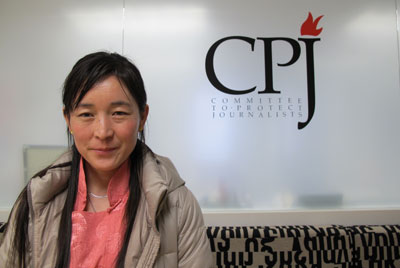Lhamo Tso has not spoken to her husband Dhondup Wangchen since March 17, 2008. She, their four children, and his elderly parents live in India, and hear of him only when his sister visits the Xichuan Prison in Qinghai province, western China, where he is serving six years. Through glass, he passes on the news: He’s contracted hepatitis, though the prison won’t let the family pay for proper medical treatment. He’s working less — promoted from 17-hour days in a brick kiln to manufacturing acupuncture needles. His two lawyers have been told their Beijing-based firm will be put out of business if they continue to work on his case.
Like her husband, Lhamo Tso did not go to school. She bakes bread to support her family. But after her husband’s 2008 arrest for filming 35 hours of interviews with Tibetans about life under Chinese rule, she was faced with a decision that would challenge the most experienced publisher. Friends brought her the footage, edited into the documentary “Leaving Fear Behind,” and asked her permission to distribute. She was in Dharamsala, a center for Tibetans in exile in northern India, safe from reprisals that follow from anti-government expression in Tibet. But her husband had disappeared into Chinese custody.
“It was very difficult,” she told CPJ on a visit to New York, speaking through a translator. “He hadn’t been sentenced yet. We didn’t know if publicizing it would hurt his chances. But in the film, so many people spoke out about their opinions, about the Dalai Lama. So many had spent time, effort, energy on this film. I thought my personal family matter was less important. The film should be shown.”
Lhamo Tso’s soft-spoken manner and sweet, shy smile hide a determination that has taken her to Europe and America to publicize Dhondup Wangchen’s imprisonment. A local court sentenced him for inciting separatism in December 2009, and he was denied appeal. Since then, she has been a dogged advocate for his release. “I’m doing this to free my husband, and to speak for the families of other Tibetans in jail,” she said. “He was not a filmmaker, so I was surprised when he made the film, but also very inspired as a Tibetan. It is a matter of pride for all of us.” She is supporting a petition created by his film company: http://leavingfearbehind.com/take-action/.
The Chinese government can appear impervious to pressure regarding its crackdown on Tibetan voices. CPJ has watched the number of jailed journalists from the region climb since Tibetans and Han Chinese clashed in March 2008, when demonstrations marking a failed uprising against Chinese rule spiraled out of control. Foreign journalists are barred from the Tibetan Autonomous Region and Tibetan areas of western China. News and communications from the region are heavily restricted. The massive security presence is apparently serving to provoke locals into increasingly drastic means of self-expression: Over 25 ethnic Tibetans have set themselves on fire in the past year, according to the BBC.
But Lhamo Tso believes that pressure does make a difference. The reason Dhondup Wangchen’s working conditions improved, she said, is because of the vocal support he is getting from outside prison walls. Besides, her children, who range in age from 11 to 16, want their father back. “You’re travelling so much to tell people about father’s case,” her 13-year-old daughter told her before she left on her latest trip. “He must be released soon.”
Do your part to make it happen, and sign the petition.
